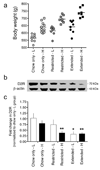Dopamine D2 receptors in addiction-like reward dysfunction and compulsive eating in obese rats
- PMID: 20348917
- PMCID: PMC2947358
- DOI: 10.1038/nn.2519
Dopamine D2 receptors in addiction-like reward dysfunction and compulsive eating in obese rats
Erratum in
- Nat Neurosci. 2010 Aug;13(8):1033
Abstract
We found that development of obesity was coupled with emergence of a progressively worsening deficit in neural reward responses. Similar changes in reward homeostasis induced by cocaine or heroin are considered to be crucial in triggering the transition from casual to compulsive drug-taking. Accordingly, we detected compulsive-like feeding behavior in obese but not lean rats, measured as palatable food consumption that was resistant to disruption by an aversive conditioned stimulus. Striatal dopamine D2 receptors (D2Rs) were downregulated in obese rats, as has been reported in humans addicted to drugs. Moreover, lentivirus-mediated knockdown of striatal D2Rs rapidly accelerated the development of addiction-like reward deficits and the onset of compulsive-like food seeking in rats with extended access to palatable high-fat food. These data demonstrate that overconsumption of palatable food triggers addiction-like neuroadaptive responses in brain reward circuits and drives the development of compulsive eating. Common hedonic mechanisms may therefore underlie obesity and drug addiction.
Figures



 ) and extended access (●) rats.
) and extended access (●) rats.



Comment in
-
Cheesecake-eating rats and the question of food addiction.Nat Neurosci. 2010 May;13(5):529-31. doi: 10.1038/nn0510-529. Nat Neurosci. 2010. PMID: 20421898 Free PMC article.
-
Dopamine and diet-induced obesity.Nat Neurosci. 2019 Jan;22(1):1-2. doi: 10.1038/s41593-018-0304-0. Nat Neurosci. 2019. PMID: 30559474 No abstract available.
References
Publication types
MeSH terms
Substances
Grants and funding
LinkOut - more resources
Full Text Sources
Other Literature Sources
Medical

